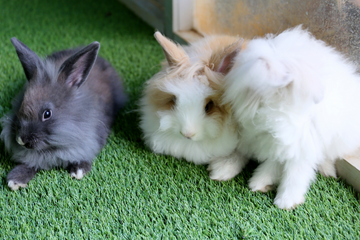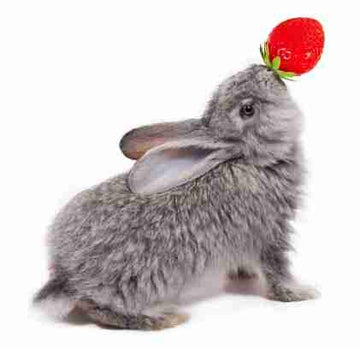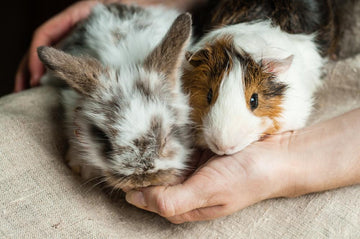What Foods Are Toxic To Rabbits?
Rabbits, with their delicate constitutions and unique digestive systems, require special care when it comes to their diet. As a responsible rabbit owner, developing an awareness of the foods that can be harmful or even toxic to your furry friend is extremely important. Below we'll answer the commonly asked question, "What Foods are Toxic to Rabbits?" to help you care for your favorite furry friend.
Click Here For a Guide to Understanding Your Rabbits Diet.
Understanding the Sensitivity of Rabbit Digestive Systems
Rabbits, with their delicate constitutions and unique digestive systems, require special care when it comes to their diet. As a responsible rabbit owner, developing an awareness of the foods that can be harmful or even toxic to your furry friend is extremely important. Below we'll answer the commonly asked question, "What Foods are Toxic to Rabbits?" to help you care for your favorite furry friend.
Common Foods That Are Toxic to Rabbits
Avocados contain a substance called persin, which is highly toxic to rabbits. Always avoid feeding any part of the avocado, including the fruit, pit, and skin to your rabbit.
Chocolate contains theobromine, a compound that is toxic to many animals, including rabbits. Keep all chocolate products, even in small amounts, away from your rabbit.
Onions and garlic, whether raw or cooked, can cause damage to a rabbit's red blood cells, leading to anemia. These ingredients are best kept out of your rabbit's diet as well.
Products containing caffeine, such as coffee and tea, should be avoided. Caffeine can have adverse effects on a rabbit's nervous system.
While many leafy greens are excellent for rabbits, iceberg lettuce is an exception. It has low nutritional value and can lead to digestive issues.
Seeds and pits from fruits such as apples, peaches, and cherries should be removed before offering the fruit to your rabbit. These can pose a choking hazard and have low nutritional value.
Foods high in starch, such as bread and crackers, should be limited. Rabbits thrive on a high-fiber, low-starch diet, and excessive starch can disrupt their digestive balance.
Human Treats
Many human treats, especially those high in sugar and additives, are not suitable for rabbits. Stick to rabbit-safe treats and avoid sharing your snacks.
For additional foods you need to avoid giving your rabbit: Poisonous foods and Never Feed (but not poisonous).
Rabbit Hole Hay's Commitment to Safe and Nutritious Products
We understand the importance of providing rabbits with a diet that supports their well-being. Our farm-fresh premier quality hay, grown in the ideal conditions of Northern California and Southern Oregon, is a cornerstone of a healthy rabbit diet. With our commitment to prioritizing the nutritional needs of your rabbits, we help to ensure that your furry friend receives the best possible care.
Safe Alternatives and a Balanced Diet
In addition to knowing what foods are toxic to rabbits, it's equally important to focus on providing a balanced and nutritious diet. Here are some safe alternatives and key elements of a rabbit's diet:
High-Quality Hay
Our Medium Timothy Hay is a staple for rabbits, providing essential fiber for dental and digestive health.
Fresh Leafy Greens
Offer a variety of fresh leafy greens, such as beet greens, romaine lettuce, and parsley, in moderation.
Vegetables
Introduce a mix of rabbit-safe vegetables like celery leaves, cucumbers, and bell peppers for added nutrients.
Safe Fruits
Treat your rabbit to small portions of safe fruits like apples, strawberries, and bananas as occasional snacks.
Rabbit-Safe Treats
Choose rabbit-safe treats designed specifically for their dietary needs. These can be used for positive reinforcement and bonding.
Prioritizing Your Rabbit's Health and Safety
Understanding what foods are toxic to rabbits is a crucial aspect of responsible rabbit ownership. By being aware of potential hazards and focusing on a diet rich in high-quality hay and rabbit-safe foods, you can ensure that your furry friend not only stays healthy but also thrives in a loving and secure environment.
Remember to consult with a veterinarian for specific dietary recommendations tailored to your rabbit's individual needs. With a careful approach to their diet, your rabbit can enjoy a happy, healthy, and safe life by your side.

Fun and Unique Names for Rabbits

Healthy Rabbit Treats for Hoppy Pets






![RHDV2 Critical Information + Frequently Asked Questions [Updated 03/20/2025]](http://www.rabbitholehay.com/cdn/shop/articles/rhdv2-critical-information-frequently-asked-questions-V1.png?v=1742490107&width=360)

